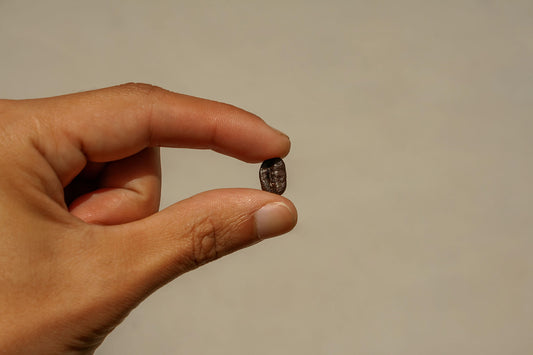The popularity of coffee with added collagen has increased significantly in recent years, as health-conscious consumers search for new and exciting ways to enhance their daily lives. This morning drink contains collagen, a structural protein that is important for maintaining healthy skin, hair, and joints.
Adding collagen to coffee is a convenient and delicious way to increase one's intake of collagen and gain the health benefits of caffeine simultaneously. This shift has been aided by the growing awareness of collagen's role in keeping skin looking young and bodies healthy.
Consumers interested in alternative medicine are likely to be intrigued by the prospect of combining collagen with coffee.
This article goes into the growing popularity of collagen-infused coffee, discussing its history, benefits, and the many reasons it has quickly become a fixture of the lives of health-conscious individuals around.

Collagen: The Beauty and Health Elixir
Collagen is a protein fibre that plays an essential role as a structural component of the human body. It is the most common type of protein in mammals and accounts for a large percentage of all connective tissues. Collagen is a protein found throughout the body that has a triple helix structure made up of amino acids (most notably glycine, proline, and hydroxyproline).
1. Role in the Body
Several crucial functions of the body rely on collagen:
- Structural Support: Connective tissues like skin, bones, cartilage, but also tendons rely on collagen for strength and stability.
- Skin Elasticity: Collagen fibres help the skin stay plump, firm, and elastic so it always looks healthy and young.
- Wound Healing: Collagen aids in the repair of torn tissues and the growth of new ones during the wound-healing process.
- Joint Health: By keeping cartilage and synovial fluid in good condition, it aids joint mobility and protects against injury.
2. Importance for Skin
Because of its essential function in maintaining healthy skin, collagen is frequently referred to as a "beauty protein."
- Wrinkle Reduction: The appearance of fine lines and wrinkles can be delayed by keeping collagen levels high.
- Hydration: It prevents dryness and keeps the skin looking fresh and radiant.
- Firmness: Having more collagen in your skin can help prevent sagging and make you look younger.
- Wound Healing: Collagen has been shown to hasten wound healing and lessen the visibility of scars and other skin imperfections.
3. Importance for Hair
Hair health is another benefit of collagen:
- Hair Strength: Hair becomes more durable and less prone to breakage because collagen acts as a structural support for hair follicles.
- Growth: A solid base is essential for hair to flourish, and this product helps provide that.
4. Importance for Nails
Collagen is beneficial for nail health:
- Strength: Nails benefit from collagen because it keeps them from becoming brittle and splitting.
- Growth: It encourages the development of strong nails, giving them a more uniform and attractive appearance.
5. Importance for Overall Health
The value of collagen goes beyond its aesthetic benefits:
- Bone Health: Bones would not be healthy without collagen because it helps them to be as strong and dense as possible.
- Joint Health: It helps maintain joint mobility and may reduce the pain felt by those with osteoarthritis.
- Digestive Health: Conditions like leaky gut syndrome may benefit from collagen's ability to strengthen the intestinal lining and promote general gut health.
Because of its many functions, collagen is often referred to as a "beauty and health elixir." Essential for a range of bodily functions, including bone and joint health, digestive function, and looking and feeling young from head to toe. Natural collagen production declines with age, so collagen supplements and skin care products are often used by those concerned with maintaining their youthful appearance and health.
The Fusion of Collagen and Coffee
The combination of the popular morning pick-me-up with the health benefits of collagen supplementation has created an intriguing new trend in the world of beverages: collagen coffee.
Collagen is a protein that forms found in the human body in high concentrations, and coffee with collagen added is a concoction that combines the benefits of coffee with those of collagen. This unique pairing is quickly gaining popularity for a variety of compelling reasons.
Because of its widely acknowledged positive effects on skin elasticity and, more recently, joint health, collagen has become a popular dietary supplement. Including protein powder in your coffee is a quick and tasty way to increase your intake of this vital nutrient.
Caffeine in coffee can be amplified by the amino acid profile of collagen, particularly glycine, proline, and hydroxyproline. The positive effects of this amino acid combination on skin, collagen production, and joint flexibility make it appealing to those who wish to enhance their general health.
In addition, collagen's potential to improve coffee's flavour extends far beyond its health advantages. Collagen can reduce coffee's bitterness and acidity, making for a more approachable cup that can be enjoyed by a wider audience. Those trying to cut back on sugar or dairy-based creamers can benefit from adding protein to their coffee because it can give it a subtle creaminess.
Collagen and coffee together provide a tantalising taste and practical benefit. Collagen is a great addition to coffee because of the potential health benefits and because it makes drinking coffee even more enjoyable. Because of this intriguing synergy, collagen-infused coffee has become a popular choice for people who want to improve both their health and their mood first thing in the morning.
Types of Collagen Used in Collagen Coffee
Collagen coffee is gaining popularity because it combines the stimulating effects of caffeine with the healing properties of collagen.
Collagen is a protein that provides structural support throughout the body, and there are numerous different kinds of collagen that serve different functions.
Bovine collagen is the most commonly used type of collagen in collagen coffee, but Type I, Type II, Type V, & Type X collagen are also used. Let's look at the different kinds and the ways they help the body:
Bovine Collagen
- Source: Collagen coffee typically uses bovine collagen, which comes from cow hides and is popular due to its accessibility and biocompatibility.
- Benefits: Type I and Type III collagen make up the bulk of bovine collagen. It helps the skin retain its suppleness and moisture. It also helps strengthen hair and nails. As an added bonus, it promotes healthy joints by easing pain and stiffness.
Type I Collagen
- Source: Most of the body's skin, bones, tendons, as well as ligaments are made of type I collagen.
- Benefits: Wrinkles are diminished and skin elasticity is enhanced. Bone density and health are two other areas where it plays a role.
Type II Collagen
- Source: Cartilage, where type II collagen is abundant, is an essential component of healthy joints.
- Benefits: It aids in the protection and mobility of joints. Collagen coffee is beneficial for those with joint problems because Type II collagen can reduce joint pain and increase mobility.
Type V Collagen
- Source: Despite its low frequency, type V collagen is an essential component of cell membranes.
- Benefits: It helps repair damaged cells and tissues. While not as well-known as Types I and II, it still plays a role in maintaining healthy tissues all over the body.
Type X Collagen
- Source: Bone growth plates are rich in type X collagen.
- Benefits: It's important for bone formation and growth. Although its use in collagen coffee is uncommon, there may be some tangential benefits for bone health.
Collagen coffee may have health benefits, but only if you know what kind of collagen is in it. Including all three types of collagen in your morning coffee could be a comprehensive strategy for improving your skin, joints, and bones.
Collagen supplements, such as collagen coffee, have shown promise in early research, but more evidence is needed to draw firm conclusions. If you have any preexisting medical conditions or dietary restrictions, you should talk to your doctor before incorporating collagen coffee into your daily routine.
Collagen Coffee Benefits for Skin
Reduces Wrinkles and Fine Lines
The collagen in collagen coffee is primarily responsible for its anti-aging effects on the skin. Collagen is an essential protein that occurs naturally in human skin and is responsible for the skin's resilience and suppleness. Wrinkles & fine lines appear because collagen production declines with age. Collagen coffee has multiple solutions for this problem:
- Collagen Production: Hydrolyzed collagen peptides are commonly used in collagen coffee because they are easily absorbed by the body. Collagen in coffee has been shown to increase the body's natural collagen production. This collagen restoration aids in enhancing skin structure and slowing the onset of wrinkles.
- Hydration: Some of the ingredients in collagen coffee are hyaluronic acid & antioxidants. Hyaluronic acid's moisture-binding properties make it useful for maintaining healthy skin moisture levels. Skin that has been properly hydrated will appear full and healthy, with fewer signs of aging like wrinkles and fine lines.
- Antioxidant Protection: Vitamins C and E, two of the antioxidants found in collagen coffee, aid in shielding skin from the oxidative stress that free radicals induce. This defence helps keep wrinkles at bay and keeps you looking young for longer.
Improves Skin Texture
Collagen in coffee has been shown to improve skin's texture by making it smoother. Collagen or other ingredients in coffee are responsible for this effect.
- Collagen Matrix: Collagen is an essential structural protein found in the skin's extracellular matrix. Collagen coffee helps strengthen this matrix, which in turn makes for softer, more even skin.
- Enhanced Elasticity: Collagen helps skin retain its elasticity by restoring its springiness after being compressed or stretched. Because of this elasticity, the surface is less bumpy and uneven.
- Hydration: Collagen coffee's hyaluronic acid and also other moisturising agents can help the skin retain water, which in turn improves the skin's texture. In general, skin that has been properly hydrated feels softer and smoother.
Promotes a Healthy Glow
There are many factors that contribute to a healthy glow, and collagen coffee can help with all of them.
- Improved Collagen Levels: Collagen plays a significant role in keeping skin flexible and supple. Because it increases collagen production, collagen coffee makes skin look radiant and healthy.
- Even Skin Tone: Vitamin C, which is commonly found in collagen coffee, can lighten hyperpigmentation and help the skin appear more even. A more radiant appearance can be achieved by maintaining a consistent skin tone.
- Hydration and Moisture: Collagen coffee's hyaluronic acid and antioxidants are great for preventing dryness and environmental damage to the skin. The skin's natural sheen is enhanced by the moisture.
Combats Skin Dryness
Those who suffer from dry skin may find particular relief by drinking collagen coffee. Skin that is dry can be flaky, tight, and uncomfortable because it lacks moisture. Collagen forms a barrier that stops water from escaping the skin, which is why it's so important.
Consuming collagen coffee on a regular basis aids in keeping the skin properly hydrated. This not only relieves dryness, but also stops further loss of moisture, so skin stays smooth and supple.
Strengthens Nails and Hair
The advantages of collagen coffee are not limited to the external body. Nails and hair benefit greatly from collagen, which is an integral part of their structure. Consuming collagen coffee gives your body the building blocks for stronger hair and nails.
Keratin, a protein found in hair and nails, is stimulated in its production by collagen coffee. This results in more resilient and lustrous hair and stronger, less easily broken nails. In addition, having healthy hair and nails can help you look years younger and more put together.
Collagen coffee's many positive effects on the skin include smoothing out fine lines and wrinkles by stimulating collagen production, boosting elasticity and hydration, and encouraging a natural glow. If you regularly drink collagen coffee, you may notice an increase in the health and vitality of your skin.
Collagen Coffee Benefits for Joints and Muscles
Relieves Joint Pain
One of the many advantages of collagen coffee for joint health is its potential analgesic effect. Our joints, like the rest of our connective tissues, rely heavily on collagen. Reduced collagen production is associated with aging and the resulting joint pain and stiffness.
By supplying the body with the amino acids and nutrients necessary to support joint health, collagen coffee can help counteract this natural decline.
Collagen peptides, which are found in collagen coffee, are quickly absorbed by the body. Cartilage, the cushioning tissue in our joints, is constructed from these peptides.
Collagen coffee has been shown to help replenish and repair damaged cartilage, which can alleviate joint pain when consumed on a regular basis. The potential anti-inflammatory effects of collagen coffee could also help reduce the discomfort of conditions like osteoarthritis.
Enhances Flexibility
By bolstering the strength and flexibility of the interconnected tissues that line our joints, collagen coffee can increase mobility. Joint stiffness and mobility decline with age because collagen production declines. Collagen coffee is a great way to get more collagen into your diet, which will help your body maintain and repair its tissues.
The peptides in the coffee's collagen aid the body's natural process of producing new collagen fibres, which strengthens the underlying structure of the joints. The improved structural integrity of the joints allows for a comfier, broader range of motion. Collagen coffee can help with joint flexibility whether you're an athlete trying to stay in top form or just someone who wants to move around more freely.
Supports Muscle Repair
Collagen coffee is good for more than just your joints; it also aids in the repair and maintenance of your muscles. Repair and growth of muscle tissue rely on the amino acids found in collagen. Muscles undergo micro-tears during exercise and other physical activities; these tears must be repaired for the muscles to grow stronger and last longer. Repair work is facilitated by collagen coffee.
Amino acids like glycine, proline, & arginine are essential for muscle recovery, and drinking collagen coffee after a workout is a great way to get your fill. You can train harder and more frequently because these amino acids promote muscle protein synthesis and alleviate muscle soreness. This is an important consideration for athletes and fitness buffs who want to improve their practise sessions.
Boosts Physical Performance
Collagen coffee's benefits extend far beyond its ability to aid in muscle repair. Glycine, an amino acid found in abundance in collagen, is necessary for the synthesis of creatine, a compound that supplies energy for high-intensity, relates to the current like weightlifting or rather sprinting. Collagen coffee has been shown to increase energy and focus during exercise, potentially improving performance.
Collagen coffee's potential benefits for joint pain and flexibility may also have a positive impact on performance in the gym. When your joints are strong and pain-free, you can move with more ease and assurance, which boosts your fitness and performance.
Reduces Exercise-Related Injuries
Collagen coffee's ability to lessen the likelihood of exercise-related injuries is an underappreciated but significant benefit. Ligaments and tendons also rely on collagen for support, just like your muscles and joints do. Sprains and strains, among other exercise-related injuries, are more likely to occur in people with compromised connective tissue.
Consuming collagen coffee on a regular basis has been shown to strengthen these tendons and ligaments, making them better able to withstand the strains of exercise. If you're less worried about getting hurt while working out, you can devote more time to your favourite physical pursuits. Collagen coffee is a great way to stay mobile and injury-free, whether you're an athlete or just someone who likes to stay active.
Collagen Coffee Benefits for Mental Clarity
Enhances Cognitive Function
Because of the unique combination of collagen & caffeine, collagen coffee can help improve cognitive function. The brain, like the rest of the body, contains the structural protein collagen. Collagen coffee, if consumed, may improve brain function in a number of ways:
- Neuroprotection: Glycine and proline, two amino acids found in collagen, play a pivotal role in the well-being of neurons and other brain cells. Collagen aids the brain's capacity to repair itself and defend itself from harm by supplying essential building blocks.
- Increased Blood Flow: Caffeine in coffee is a natural stimulant that has been shown to increase cerebral blood flow. Memory, focus, and the ability to solve problems are just some of the cognitive abilities that can benefit from increased blood flow to the brain.
- Neurotransmitter Regulation: Neurotransmitter activity may also be affected by collagen and caffeine. Dopamine and norepinephrine, neurotransmitters linked to elevated mood and heightened alertness, may be released in response to caffeine. Amino acids in collagen can aid in the production of acetylcholine and other brain chemicals necessary for proper mental operation.
Supports Memory
The ability of collagen coffee to improve brain health is directly related to its potential to aid in memory retention. The development and upkeep of neural connections are essential for memory functions, & collagen can play a role in this process.
- Synaptic Plasticity: Synaptic plasticity, or the capacity of neurons to change and strengthen their connections, is maintained in part by the amino acids found in collagen, particularly glycine. Better memory formation & retention can be achieved by increasing synaptic plasticity.
- Antioxidant Properties: Antioxidants, such as vitamin C, are abundant in collagen and can help prevent oxidative damage and stress to brain cells. When the brain is in good shape, it's easier to hold on to memories.
Reduces Mental Fatigue
The collagen and caffeine in collagen coffee are responsible for its ability to combat mental exhaustion.
- Sustained Energy: Caffeine gives you a quick jolt of energy, but collagen can keep you going all day long. This avoids the drowsiness and energy slumps that come with drinking coffee every day.
- Stress Reduction: Glycine, which is found in collagen, is known to have a sedative effect. Caffeine can trigger a stress response in the body, and this supplement may help reduce or eliminate those negative side effects so that you can focus more clearly.
Elevates Mood
The synergy between caffeine as well as collagen is responsible for collagen coffee's mood-boosting effects:
- Dopamine Release: Coffee's caffeine boosts your mood because it causes your brain to produce more of the neurotransmitter dopamine. A happier and more upbeat disposition may result from this.
- Stress Reduction: Glycine, which is found in collagen, has an anxiolytic effect and works well with the stimulant properties of caffeine. This may be the perfect recipe for a more stable and peaceful state of mind.
Increases Energy Levels
Collagen coffee is great for mental work because it gives you a steady flow of energy all day long.
- Caffeine's Energy Boost: Caffeine is widely known as a stimulant that can make you feel more awake and energised. It can give you the mental stamina you need when mixed with coffee.
- Collagen's Sustained Energy: Amino acids like glycine and proline found in collagen help control blood sugar, which means you won't experience the same jolts to your energy levels. This leads to elevated levels of stamina, which in turn promotes uninterrupted concentration and output.
The collagen in coffee has brain-supporting properties, and the caffeine boosts mental performance in a novel way. This combination shows promise as a means to improve cognitive performance and memory, as well as to lessen mental fatigue, boost mood, and supply sustained energy for mental tasks.
Collagen Coffee: Your Daily Beauty and Wellness Ritual
The beauty and health benefits of collagen coffee have made it a popular addition to many people's daily routines. Start your day off with a cup of collagen-infused coffee to easily incorporate this superfood blend into your routine.
To maximize the skin-nourishing effects of collagen, take it first thing in the morning, when absorption is at its peak. To make a simple change for the better, just swap out your regular coffee for a collagen-infused variety. Add a scoop of collagen powder to your post-workout smoothie or drink of choice.
This protein-rich snack is perfect for refuelling your muscles and joints after a workout. If you're looking for something to do before bed, decaf collagen coffee is a great way to unwind without disrupting your sleep schedule.
If you want the full benefits of collagen, be sure to mix it well so that it is evenly distributed. Incorporating collagen coffee into your daily routine is like investing in your health and beauty while also enjoying a delicious cup of coffee.
Juju Blends: Your Source of Premium Collagen Coffee
Here at Juju Blends, we offer premium collagen coffee that combines the delicious aromas and flavours of coffee with the many health benefits of collagen. Because of their innovative and easy-to-use collagen supplement, Juju Blends has earned a solid reputation in the health and wellness sector.
But what truly separates Juju Blends from the competition is their relentless pursuit of quality. Collagen is sourced from reliable vendors with a reputation for producing high-quality products.
To ensure that every batch of collagen coffee is pure and effective, it is subjected to stringent testing and quality control procedures. Enjoy the rich flavour of coffee with the knowledge that you're providing your body with the nutrients it needs, thanks to Juju Blends, who are committed to providing only the best.
Frequently Asked Questions
Can you add collagen to coffee?
Yes, you can add collagen to coffee. There are various collagen supplements available, including collagen powder or collagen creamer, that can be mixed into your coffee.
Why add collagen to coffee?
People add collagen to coffee for potential benefits like improved skin health, joint support, and hair and nail growth. It's also an easy way to incorporate collagen into your daily routine.
Does collagen affect the taste of coffee?
Collagen typically doesn't significantly alter the taste of coffee, especially if you use flavorless collagen powder or collagen creamer. However, some products may have a slight flavor or creaminess.
How much collagen should I add to my coffee?
The recommended collagen dosage can vary depending on the product and brand. Typically, one to two scoops or packets per day is a common starting point, but it's best to follow the manufacturer's instructions.
Is collagen in coffee effective?
The effectiveness of collagen in coffee can vary from person to person. Some users report positive effects on their skin, hair, and joints, while others may not experience significant changes. Results may take time to become noticeable.
Conclusion
In recent years, interest in the health benefits of collagen in coffee has increased. Collagen is a protein that helps keep our skin flexible and our joints healthy. It is found in our skin, bones, or connective tissues.
Collagen supplements are a handy way to work this protein into your routine, and they mix well with coffee. Collagen in coffee has been studied for its potential to lessen the signs of aging and promote healthy hair, skin, and nails.
It's important to remember, though, that there isn't a ton of hard data to back up these claims just yet, and that your mileage may vary. Collagen in coffee may sound interesting, but before you try it, you should talk to your doctor to make sure it will help you achieve your health goals.




